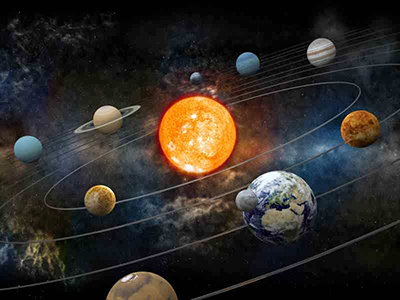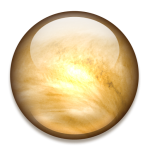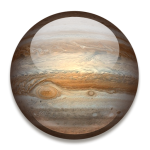
When it comes to astrology, most people know a little about the 12 different signs of the zodiac, even if they don’t “believe” in them.
This is generally tied to Sun sign astrology, which represents only a tiny portion of what astrology really is. But there’s so much more to astrology than Sun signs, just as there’s so much more to our solar system than the Sun.
Astrologers look at all of the planets — as well as the Sun and Moon — when interpreting a natal chart. Each of those planets is looked at in the context of the sign its placed in at birth, as well as its house position and relationships with other planets.
But for the purposes of this article, we’re going to be looking at only the planets (which also, for the purposes of this article, will include the Sun and Moon). The Sun and Moon are referred to as luminaries in astrology and are treated as planets. They’re certainly as important (usually more important) than the other nine bodies.
In the coming weeks, we’ll look at signs and houses too, which from an astrological perspective can tell you a great deal about not only who you are, but where you came from and where you’re heading.
There’s naturally a lot more to astrology than this. But with that in mind, let’s look at what each of the planets can tell you about you and your loved ones.

It’s your light, your essence, your spirit and your Self. Your consciousness. Your personal center. The external expression of who and what you represent.
It’s the yang or masculine principle, which is generally the face that you present to the outer world.
The sign that your Sun is in will you tell you how you manifest that energy and the house it’s in will tell you where you’re mostly likely to manifest it. What area of your life does everything else revolve around? Where (and how) do you assert your own personal power?

It describes your ability to express feelings and emotions, and also what you need in order to feel secure. It’s the yin or Universal female energy, which is more unconscious and instinctual but just as important as (and sometimes even more important than) the Sun.
The sign your Moon is, as well as its house placement and the aspects it makes to other planets, will tell you a lot about how you manifest that energy. How do you express your emotions? How would you describe your relationship with your mother (or with women in general)? How would you describe your childhood or your ideal home? And what do you need in order to feel secure? These are all functions of the astrological Moon.

Mercury is such a tiny planet and it moves so fast that we sometimes forget how powerful it is. But when it goes retrograde people tend to stand up and take notice. Because Mercury not only ties in with how you personally express your ideas, but also how communications in general are received.
Things tend to go haywire when Mercury is retrograde (which happens three or four times every year).
This is because Mercury rules not only verbal communications, but also the written word (news sources, contracts, letters, emails etc.), communications devices (phones, radios, televisions, computers, etc.) and the personal concept of time (appointments and schedules, etc.)
The sign and house placement of your natal Mercury can tell you a great deal about how you think, what you think about and how you express those thoughts to others.

How you relate to others (both in and out of relationship). What flips your love switch as well as how you go about flipping someone else’s. How you perceive beauty, what you find aesthetically appealing and how you express your personal style.
Venus also relates to values in the sense of how much value you place on yourself, your income, money and possessions, and your relationships with others.
The sign and house placement of your natal Venus will tell you how (and where) you’re likely to express these qualities. What (and whom) you’re attracted to. How willing you are to accommodate the needs of others. How you conduct yourself in relationship and what your own relationship expectations are. Also how you feel about money, which includes earning it, spending it and saving it.
Mars represents your drives, urges and initiatives. Your actions. Your stamina and libido. Your energy levels and metabolism.
It describes your natural instincts and motivations. What you are compelled to do, and what you’re passionate about from a primal or instinctual standpoint.
Mars is assertive, dynamic and goal-oriented, as filtered through its sign and house placement.
Mars and Venus work in tandem to set up your personal love paradigm. It’s the “me” factor in a relationship (as opposed to the “we” factor, which is primarily Venus).
Your natal Mars placement — by sign and house — will describe how and where you tend to exert the most energy. What you’re driven to go after in life and how you go after it. How you assert yourself and what you’re most passionate about. As Mars can manifest as anger, aggression and impatience, it can also describe what you’re willing to fight for.
Jupiter is tied to belief systems and ideologies. The higher mind. Formal education and spiritual teachings. Religious values. Principles and ideals.
It’s also related to travel, foreign affairs and other cultures. In other words, anything that takes you out of auto-pilot and propels you toward expanding your horizons.
Jupiter is called the planet of Luck. It relates to benefit, gain and fortune. Personal expansion. Optimism, generosity and joviality.
As the largest planet in our solar system, Jupiter describes what you do in a Big Way. What you believe in. What you’re confident in putting out there, knowing that your efforts will succeed. In contrast to Mercury — which is more about what you think — Jupiter represents what you have faith in, or what you “just know.”
Your natal Jupiter placement will not only describe where you tend to be most expansive and optimistic, but where the Universe supports you and brings you luck. It can show you where things come to you a little more easily and where you don’t have to work so hard to receive the benefits that the Universe has to offer.

What is it you feel unsure of? Not ready for? Not good enough at? These are all linked with Saturn, which tends to enforce barriers between you and whatever you most want to accomplish.
It describes what you don’t feel comfortable with or confident in. What you’re unsure of. What you feel has been withheld from you or is always just outside of your reach.
Saturn is known as both the Lord of Karma and the Lord of Time. It’s about working through issues in this lifetime (karma) in order to advance your evolutionary process. And it’s about knowing that discipline, perseverance and stamina (all Saturn key-words and all related to time) are necessary in order to progress, which is ultimately what Saturn is most interested in.
Your natal Saturn — by sign and house — will describe your fears and inhibitions. The obstacles that life sends your way. Where things seem more difficult or arduous for you than they are for others. And where you’re going to have to work through your own personal karma in order to master those specific challenges.

On a personal level though, it describes what sets you apart from everyone else. In what ways you’re unique, original or non-conformist. How you might rebel against status-quo expectations, where you might think outside the box or where you might fly your very own freak flag.
As the higher octave of Mercury, Uranus is also tied to flashes of genius and insight. It’s inventive, progressive and forward thinking. It relates to expressing your own personal opinions (in contrast to Mercury’s penchant for absorbing facts and ideas that have been gathered from other sources).
The sign and house placement of Uranus in your natal chart will tell a lot about your own flashes of brilliance and insight. Where you’re most progressive and ahead of your time. And where you are most likely to express your own unique personality, viewpoints and ideas.
It will describe where you tend to think for yourself, rebel against societal norms and march to the beat of your own drum. It can also describe where you can be opinionated or argumentative. Where you insist on being right or refuse to listen to another’s point of view. And where you say or do things just for their shock value.
Neptune is the higher octave of Venus. It relates to Universal love (in contrast to Venus’ association with personal, intimate and romantic love).
It’s intuitive, reflective and all-encompassing. It’s visionary, idealistic and non-judgmental. It’s about unconditional love, understanding, compassion and forgiveness.
It’s linked with the collective unconscious and as such represents Universal connections — how we’re all the same (in contrast to Uranus which describes how we’re all different) and how we’re all interconnected. In this respect it can be too idealistic, too gullible and too naive. The desire to see only the good in others can leave you susceptible to being taken advantage of.
Depending on the sign (and more importantly — as Neptune is another generational planet — the house) your Neptune falls in in your natal chart, this placement will describe where you are at one with the Universe, how you merge with others, and your connection to the cosmic source. Where you’re most capable of expressing compassion and forgiveness and experiencing unconditional love.
It can also describe escapist tendencies and personal delusions. Where you lack boundaries and structure, where your life may be most chaotic and undefined, and where you’re most susceptible to being deceived (by yourself or others).

Both are also associated with “power.” But there are important distinctions between the assertion of power for Mars and Pluto. With Mars it’s more about instinct; with Pluto it’s more about survival.
Pluto is tied to self-mastery and personal transformation, which we all know doesn’t just happen. It’s a deep-seated pain — a woundedness that comes from experiences of loss, violation, exposure and persecution — that fuels Pluto’s need to conquer its inner demons.
Much like the mythical Phoenix rising from the ashes, your natal Pluto placement will tell you where you’ve experienced the greatest pain. Where you’ve felt persecuted, exposed or wrongfully accused. And where you feel the most vulnerable to loss, rejection and betrayal. As a result, this is also where you’re going to make the most progress toward reinventing yourself, toward overcoming your fears and gaining control of your environment, and ultimately emerging — stronger than ever — from those fiery ashes.
While modern day astronomers have demoted Pluto to what’s now called a “dwarf planet,” any astrologer (or anyone who’s ever been through a Pluto transit) can tell you it still packs a hell of a punch.
In the coming weeks we’ll look at signs and how the individual planets express themselves through each of the astrological sign archetypes. After that we’ll look at houses and aspects and so on.
In the meantime, feel free to comment or ask questions about any of your natal planets in the comments section below.
Astrologers do it with Heavenly Bodies
by
Sessions
I am available for live chat consultations in 30 and 60 minute increments, payable through PayPal. Payment information and PayPal links are accessible through the sidebar on the right.
Please note that I do not offer free readings and these are the lowest rates you will find me at online. I am located in the US, in the Eastern time zone.
Feel free to pop into my chatroom if you see me available live, or leave me a message below if you don’t.
Visit my websites: Ask the Astrologers and Melodie Sheppard

Steven Forrest’s Inner Sky and Changing Sky books are classics that every serious astrologer has in their library, as is Tracy Marks’ Art of Chart Interpretation.
As an Amazon Associate I earn from qualifying purchases such as these, so please do take a moment to see what’s there.
- Weekly Astrology Forecast — April 7, 2025 – April 13, 2025 - April 7, 2025
- Weekly Astrology Forecast — March 31, 2025 – April 6, 2025 - March 31, 2025
- Weekly Astrology Forecast — March 24, 2025 – March 30, 2025 - March 24, 2025





